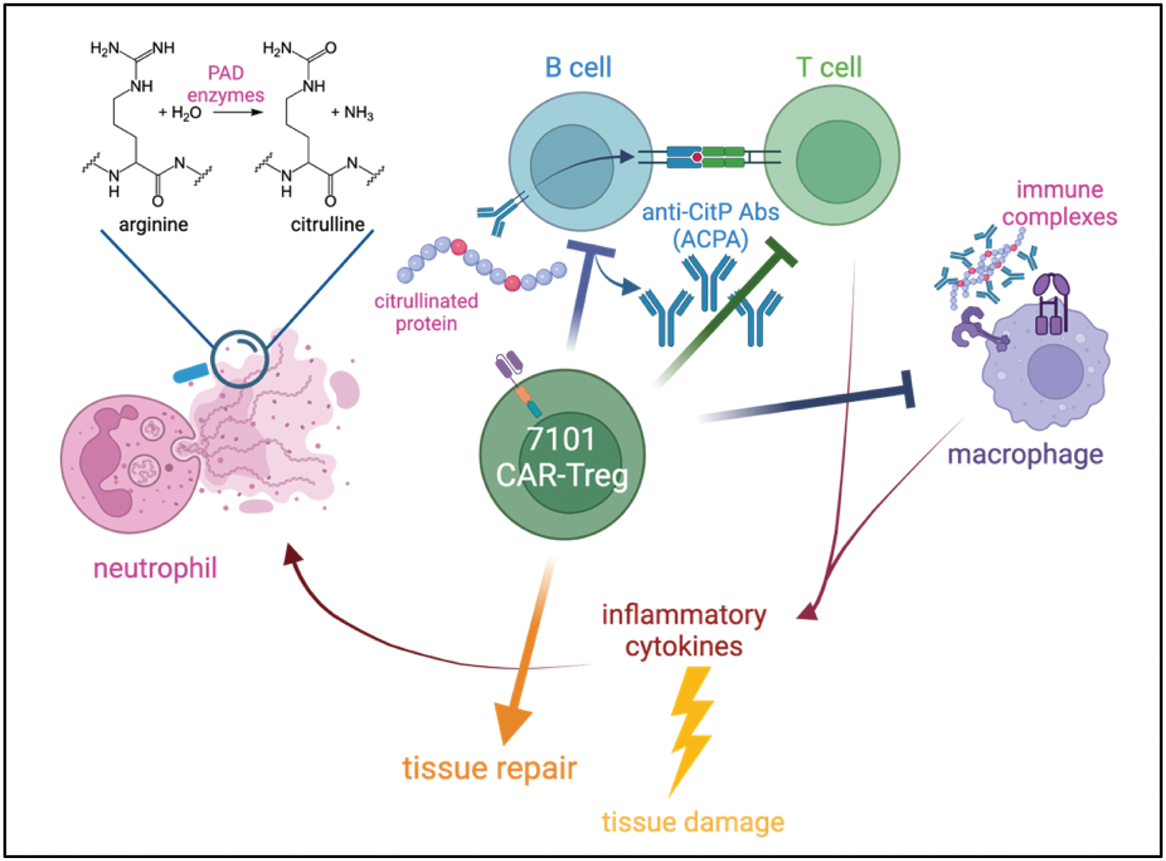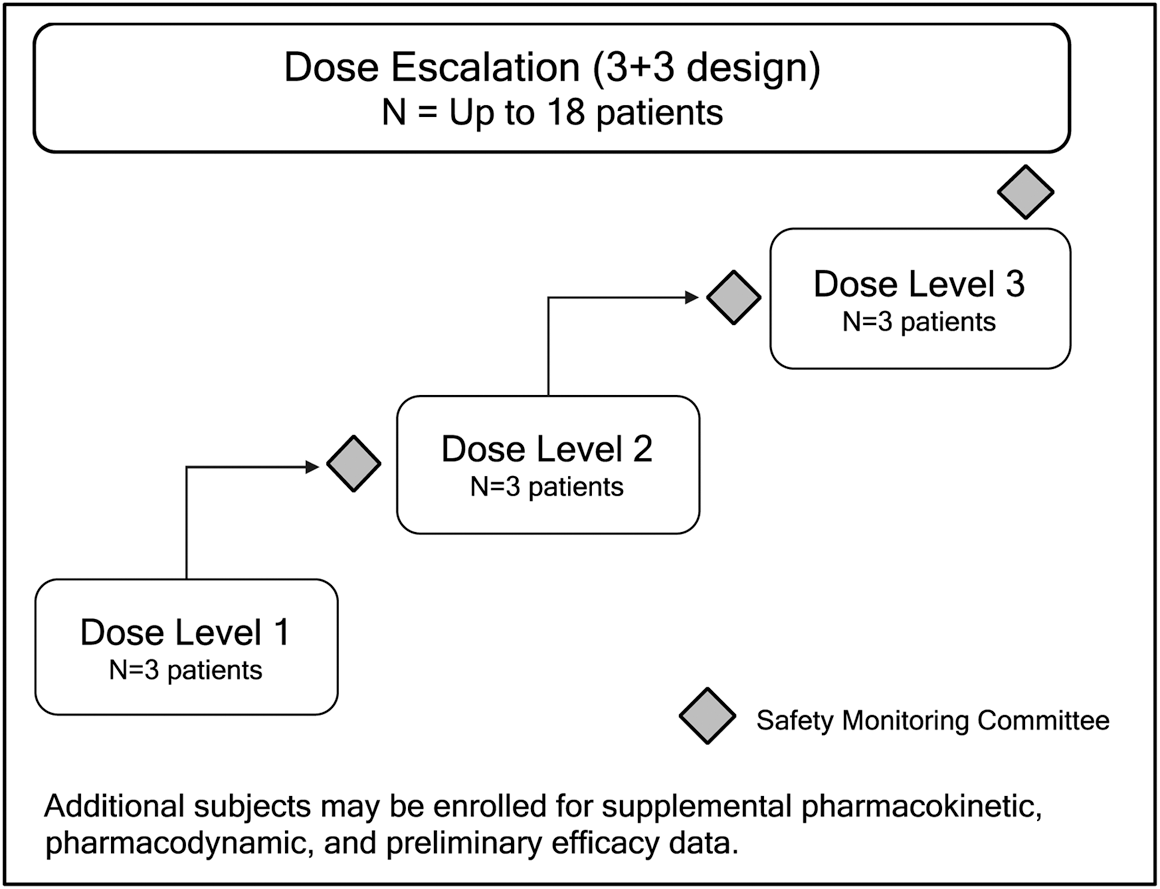

Background: Regulatory T cells (Tregs), a subset of CD4+ T cells that modulate inflammation, maintain self-tolerance, and promote tissue repair without compromising host defense, hold promise as a versatile therapeutic tool. Polyclonal Treg therapies have been previously tested in patients with various inflammatory diseases and demonstrated a favorable safety profile and durability, but efficacy outcomes were mixed. Engineered Tregs offer a novel cellular therapy approach to restore immune tolerance. SBT777101 is an autologous Treg preparation transduced with a chimeric antigen receptor (CAR) specific for citrullinated proteins (Cit-P). In contrast to most existing CAR-T immunotherapies, which harness effector T cells to kill pathogenic target cells, the goal of treatment with SBT777101 is to restore balance to the immune system without cell destruction or lymphodepletion. Extracellular Cit-P are found in inflamed synovium of patients with rheumatoid arthritis (RA), serving as antigens that can be targeted by a Cit-P specific CAR (Figure 1). We hypothesize that SBT777101 will recognize and become activated by Cit-P in inflamed synovial tissue. These engineered Tregs can modulate pathogenic inflammation through pleiotropic effects such as bystander suppression of antigen presenting cells and effector T cells, IL2 consumption, and immunomodulatory cytokine production to promote immune homeostasis and tissue repair in patients with RA.
Objectives: REGULATE-RA is an ongoing first-in-human, phase 1, open-label study to evaluate the safety and tolerability of autologous CAR-Treg therapy targeting Cit-P in patients with refractory RA. Exploratory endpoints include the assessment and characterization of SBT777101’s pharmacokinetic profile, pharmacodynamic parameters, mechanism of action, and preliminary efficacy.
Methods: The study includes patients aged 18-70 years with RA, as defined by the 2010 ACR/EULAR classification criteria with moderate-to-severe active disease (DAS28-CRP ≥ 3.2). Eligible patients must have demonstrated an inadequate response to, or intolerance of, at least three prior biologic or targeted synthetic DMARDs with differing mechanisms of action. Autologous Tregs are isolated from apheresis products and engineered to express a CAR specific to Cit-P, generating the SBT777101 investigational product. The investigational product is administered intravenously in escalating doses in a 3 + 3 dose-escalation design to determine the maximum tolerated dose (Figure 2). Cohorts of three patients are treated at each dose level, with dose escalation proceeding only in the absence of dose-limiting toxicities (DLTs), as assessed by an independent Safety Monitoring Committee. Patients are monitored for adverse events and clinical response over the 48-week study period. Pharmacokinetics, pharmacodynamics and mechanism of action are evaluated in peripheral blood and, where available, synovial samples. All patients are encouraged to participate in a 15-year long-term follow-up study for safety evaluation.
Results: Prior to patient enrollment, a manufacturing process for SBT777101 was established and shown to produce consistent yield, functionality, and molecular signatures in both healthy donors and RA patients. For dosed patients, the yield and molecular signatures of manufactured products have remained consistent with these preclinical manufacturing results. As of January 2025, three patients have received infusions of SBT777101, with no severe adverse events or DLTs observed. Three additional patients are enrolled but are not yet dosed. The enrolled patients are demographically diverse, with ages ranging from 26 to 68. Three patients are Hispanic, and three are White. All patients are female and are both rheumatoid factor (RF) and anti-cyclic citrullinated peptide (anti-CCP) positive. Baseline disease activity score 28 with CRJP (DAS28-CRP) ranges from 3.7 to 6.5. Swollen joint count (SJC28) ranges from 5-20, and tender joint count (TJC28) ranges from 4-27. All three dosed patients tolerated the infusion well, with no cytokine release syndrome, neurotoxicity, or other immune-mediated toxicities detected. Clinical assessments and biomarker analyses are ongoing to assess changes in disease activity, systemic inflammation and Treg activity.
Conclusion: To date, CAR-Treg therapy targeting Cit-P demonstrates a favorable safety profile in this early phase study. Ongoing enrollment and follow-up will provide additional insights into efficacy and pharmacodynamic outcomes.
SBT777101 targets citrullinated proteins. Citrullinated intracellular proteins (CitP) are released by activated neutrophils undergoing NETosis. CitP can serve as autoantigens leading to the formation of anti-CitP antibodies (ACPA), citrullinated peptides presented on HLA-DRB*01 “shared epitope” alleles activate T cells, and CitP-ACPA immune complexes activate macrophages. These innate and adaptive immune processes amplify inflammation leading to tissue damage. Engineered Tregs expressing a CAR reactive to CitP are hypothesized to downmodulate multiple inflammatory processes and promote tissue repair.

REGULATE-RA study design. REGULATE-RA is a first-in-human phase 1 dose-escalation study. Each dose level cohort comprises three patients, with a safety monitoring committee evaluation prior to escalation to the next dose level.

REFERENCES: NIL.
Acknowledgements: NIL.
Disclosure of Interests: Sarah K Baxter Sonoma, Larry Moreland Celltrion and Boehringer Ingelheim, Melissa Griffith Sonoma, BMS, Gilead, Elena Massarotti EMD, Xencor, Janux, Pioneering Med Partnerships, Cabaletta, Argenyx, Otsuka, Kezar, Jeffrey A. Sparks AbbVie, Amgen, Boehringer Ingelheim, BMS, Fresenius Kabi, Gilead, GSK Inova Diagnostics, J&J, Merck, MustangBio, Novartis, Optum, Pfizer, ReCor, Sana, Sobi, and UCB, Tamiko R. Katsumoto Genentech, Sanofi, Steven Vlad: None declared, Fawad Aslam ANI, Sonoma, Jennifer Seifert: None declared, Andrew Clauw: None declared, Rita Gyurko: None declared, Olivia Gabriel: None declared, Ari Bitton Sonoma, Sabrina Fox-Bosetti Sonoma, Yuanyuan Xiao Sana, Sonoma, Mindy Jensen Lovance, Sonoma, Mark G Fromhold Sonoma, Amanda L Pace Sonoma, Herve Lebrec Amgen, Sonoma, Michelle L Blake Sonoma, Anne-Renee van der Vuurst de Vries Sonoma, Mei-Lun Wang Sonoma, Joshua N Beilke BMS, Sonoma, BMS, Joseph R Arron Roche, Sonoma, Jeffrey A Bluestone Gilead, Sonoma, Gilead.
© The Authors 2025. This abstract is an open access article published in Annals of Rheumatic Diseases under the CC BY-NC-ND license (